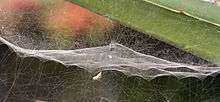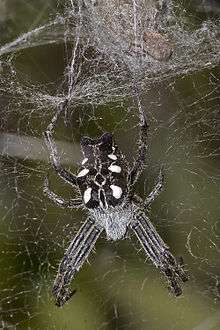Cyrtophora citricola
Cyrtophora citricola, also known as the tropical tent-web spider, is an araneid spider that occurs in the warmer parts of Europe, Asia and Africa, but also Australia, Costa Rica, Hispaniola and Colombia. It can now also be found in other parts, such as Florida, where it was first found in 2000.


| Cyrtophora citricola | |
|---|---|
 | |
| C. citricola from Portugal | |
| Scientific classification | |
| Kingdom: | Animalia |
| Phylum: | Arthropoda |
| Subphylum: | Chelicerata |
| Class: | Arachnida |
| Order: | Araneae |
| Infraorder: | Araneomorphae |
| Family: | Araneidae |
| Genus: | Cyrtophora |
| Species: | C. citricola |
| Binomial name | |
| Cyrtophora citricola (Forskål, 1775) | |
| Synonyms | |
|
Aranea citricola | |
Although it is in the family commonly called Orb Web Spiders, this spider does not build orb webs. Their horizontal web forms a cone in the middle, with many support lines holding it. The web is not sticky, and spiral and radials are constructed from the same silk. Unlike in orb webs, all cells in the web are rectangular.
C. citricola's color may vary greatly; whereas many sport a black and white pattern, others are brown, males sometimes appear black. The females resemble a piece of dead leaf, and will sometimes hide in debris that has fallen into the web. Body length in females normally reaches 10 mm, with males only 3 mm long. Many females can build their webs in close vicinity, and colonies with hundreds of individuals have been observed. Colonial C. citricola were found to catch the same amount of prey with smaller webs, compared to solitary specimens. Colonies often consist of the offspring of a single female, that do not disperse after hatching.
Adult males do not build webs and stop eating. Females usually eat the males during or immediately after mating (sexual cannibalism).[1] Females may live long enough to guard their young, but sometimes die before hatching occurs. The flattened, elliptical egg sacs are up to 20 mm long, with a bluish to greenish hue, and up to ten egg sacs can be produced by a female.
Etymology
Cyrto - humpback, phora - bearing, citricola - living on citrus trees
References
- "Mate Choice in Spiders". www.biointeractive.org. HHMI. Retrieved 7 December 2019.
- Sources
- Álvares, É.S.S. & De Maria, M. (2004). First record of Cyrtophora citricola (Forskål) in Brazil (Araneae, Araneidae). Revista Brasileira de Zoologia 21(1):155-156 PDF doi:10.1590/S0101-81752004000100026
- Edwards, G.B. (2006): Cyrtophora citricola (Araneae: Araneidae), a Colonial Tentweb Orbweaver Established in Florida. Entomology Circular 411:. PDF
- Platnick, Norman I. (2009): The world spider catalog, version 10.0. American Museum of Natural History.
External links
| Wikimedia Commons has media related to Cyrtophora. |
- Pictures of C. citricola
- Pictures and information on C. citricola from Portugal
- Cyrtophora citricola on the UF / IFAS Featured Creatures website.